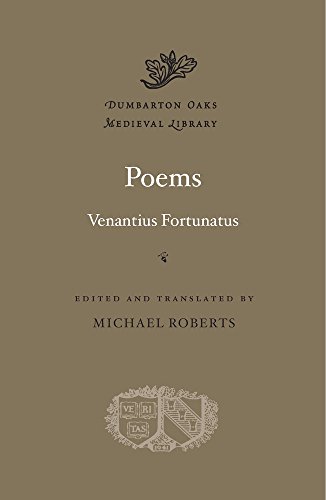All books / Book
Poems (Dumbarton Oaks Medieval Library)

| Full title: | Poems (Dumbarton Oaks Medieval Library) |
|---|---|
| ISBN: | 9780674974920 |
| ISBN 10: | 0674974921 |
| Authors: | Fortunatus, Venantius |
| Publisher: | Harvard University Press |
| Num. pages: | 944 |
| Binding: | Hardcover |
| Language: | en |
| Published on: | 2017 |
Read the reviews and/or buy it on Amazon.com
Synopsis
The Present Volume Is The First English Translation Of All Twelve Books [books 1-11 + Appendix + Figure Poems] Of Fortunatus's Poetry. The Only Poem Omitted Is The Hexameter Vita Sancti Martini. Books 1 To 3 And 5 Are Addressed To Figures In The Church Or Deal With Religious Matters; Books 6 And 7 Are Addressed To Secular Figures. Book 4 Stands Apart And Is Made Up Entirely Of Epitaphs, Including To Church And Secular Figures, And Book 8 Gathers Poems Dedicated To The Convent Of The Holy Cross, Its Founder, Radegund, And Its Abbess, Agnes, Along With A Succession Of Poems To Fortunatus's Chief Patron, Gregory Of Tours. Fortunatus Adopts A Variety Of Tones In His Poetic Corpus, But Characteristically Praise Of His Subject Or Addressee Plays A Prominent Role. The Subjects Include The Great And The Good In Merovingian Society, From Substantial Panegyrics Of Kings To Less Ambitious Compositions On Bishops Or Other Clergy That Rehearse Their Virtues, Including Charitable, Preaching, And Building Activities. Preserved Among Fortunatus's Poems Are Eight Letters In Prose--nine, If The Dedicatory Letter To Gregory Is Included--and Two Prose Treatises, The First, On The Lord's Prayer, Incomplete.-- The Eleven Books Of Poetry By Venantius Fortunatus Include Well-loved Hymns, Figure Poems, Epigrams On Miracles, And Elegies In The Voices Of Abandoned Or Exiled Women. The Sixth-century Poet Began His Career In Northern Italy Before Moving To Gaul, Where He Wrote For The Remainder Of His Life—praising Kings And Elites Of The Merovingian Dynasty And Describing The Natural Scenery And Society Of His Adopted Homeland During The Transition From Late Antiquity To The Early Middle Ages. In His Lively And Inventive Style, Fortunatus Also Addressed Verses To Religious Figures Such As His Patron Gregory Of Tours And To Holy Women Such As Radegund, Founder Of The Convent Of The Holy Cross In Poitiers, And Agnes, The Convent’s First Abbess. Fortunatus’s Imaginative Metaphors And Wry, Self-mocking Humor Ensure His Place In The Canon Of Christian Latin Poets. This Volume Presents For The First Time In English Translation All Of His Poetry, Apart From A Single Long Saint’s Life In Verse.-- Venantius Fortunatus ; Edited And Translated By Michael Roberts. Includes Bibliographical References (pages 895-897) And Index. Texts In Latin With English Translations On Facing Pages; Introduction And Notes In English.